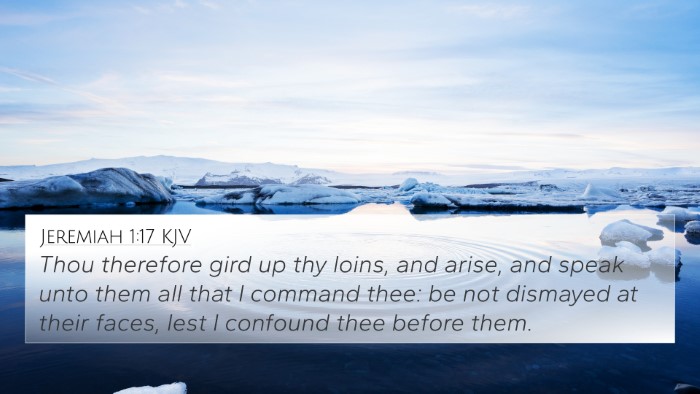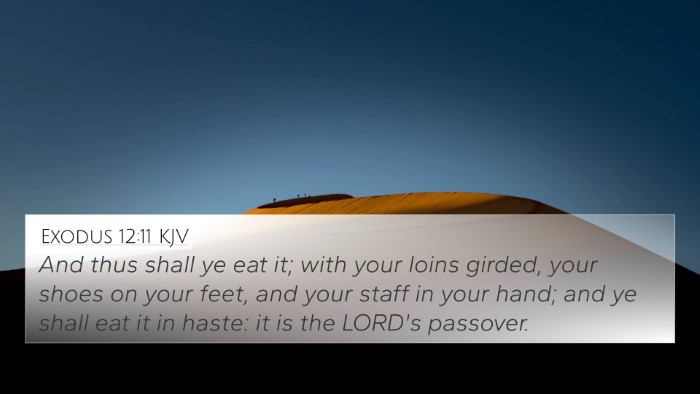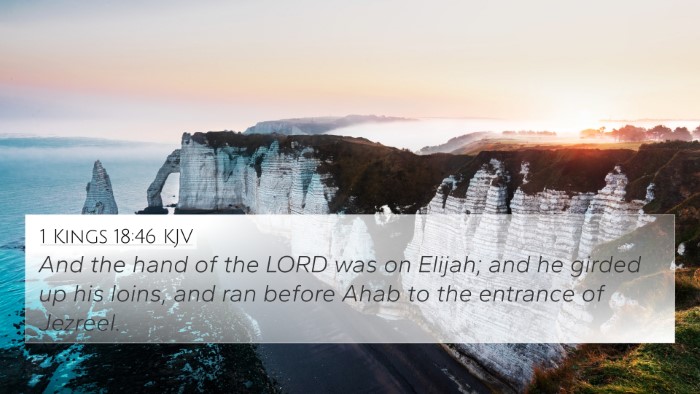Understanding Job 38:3
Job 38:3 states, "Gird up now thy loins like a man; for I will demand of thee, and answer thou me." This verse marks a significant moment in the Book of Job, where God responds to Job's questions and challenges. It emphasizes God's authority and power over creation, showcasing His desire for Job to prepare himself to receive wisdom and understanding.
Verse Context and Overview
This statement is made by God after Job has endured immense suffering and has questioned the reasons for his torment. God’s response serves to remind Job of his limitations as a human and the greatness of God. It is a call to prepare for an encounter that will reveal God's majesty and the order of the universe.
Insights from Public Domain Commentaries
-
Matthew Henry Commentary:
Henry emphasizes the call to “gird up thy loins,” which indicates preparation and readiness to address God’s inquiries. God’s rhetorical questions highlight His omniscience and omnipotence, asserting that Job cannot fully comprehend divine wisdom.
-
Albert Barnes Commentary:
Barnes discusses God's challenge to Job, illustrating the need for humility in the face of divine wisdom. The call to “gird up thy loins” serves as a metaphor for mental and spiritual readiness to engage in a profound dialogue about creation and God’s overarching plan.
-
Adam Clarke Commentary:
Clarke notes that God’s command to Job reflects the seriousness of the discussion about to take place. He highlights the significance of God demanding an answer, indicating that while God is just, He also desires a response from His creation.
Thematic Connections and Cross-References
This verse connects thematically with several others in the Bible that deal with God’s sovereignty, human suffering, and the quest for understanding. Here are some cross-references to consider:
- Isaiah 40:12: “Who hath measured the waters in the hollow of his hand...” This verse emphasizes God’s power and invites reflection on human limitations.
- Job 31:35: “Oh, that I had someone to hear me! I signed my defense—let the Almighty answer me...” Job desires an audience with God, which God provides through His questioning in Job 38.
- Romans 9:20: “But who are you, O man, to answer back to God? Will what is molded say to its molder, ‘Why have you made me like this?’” This verse echoes the theme of human response to divine authority.
- Proverbs 3:5-6: “Trust in the Lord with all your heart, and lean not on your own understanding.” This encourages faith in God's wisdom despite life’s mysteries, as seen in Job's story.
- Psalms 147:5: “Great is our Lord, and of great power: his understanding is infinite.” This reinforces the nature of God’s wisdom, as questioned by Job.
- Ecclesiastes 3:11: “He hath made every thing beautiful in his time: also he hath set the world in their heart...” This speaks to God’s overarching plan in creation.
- Jeremiah 33:3: “Call unto me, and I will answer thee, and show thee great and mighty things, which thou knowest not.” Reflects God's willingness to reveal understanding when approached with humility.
Understanding Through Cross-Referencing
The method of cross-referencing Biblical texts in study can illuminate the themes present in Job 38:3 and provide deeper insights. By examining how these verses relate to Job 38:3, one can grasp the broader context of God’s conversation with humanity regarding suffering, power, and understanding.
Tools for Bible Cross-Referencing
Utilizing bible concordance and bible cross-reference guides can help in discovering these connections. Resources like comprehensive cross-reference materials allow readers to navigate scripture effectively and observe how various passages interlink.
Conclusion
Job 38:3 is a profound moment that underscores the relationship between God and humanity. It challenges believers to consider their place in the divine order and the nature of God's wisdom compared to human understanding. By exploring the connections between Bible verses through thematic analysis and scriptural cross-referencing, one can gain a fuller comprehension of both this verse and the vast narratives woven throughout scripture.











